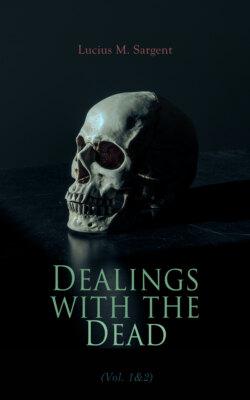Читать книгу Dealings with the Dead (Vol. 1&2) - Lucius M. Sargent - Страница 14
На сайте Литреса книга снята с продажи.
No. IX.
ОглавлениеTable of Contents
When I first undertook, there was scarcely any variety, either in the inscriptions, or devices, upon gravestones: death’s heads and crossbones; scythes and hour glasses; angels, with rather a diabolical expression; all-seeing eyes, with an ominous squint; squares and compasses; such were the common devices; and every third or fourth tablet was inscribed:
Thou traveller that passest by,
As thou art now, so once was I;
As I am now, thou soon shalt be,
Prepare for death and follow me.
No wonder people were wearied to death, or within an inch of it, by reading this lugubrious quatrain, for the hundredth time. We had not then learned, from that vivacious people, who have neither taste nor talent for being sad, to convert our graveyards into pleasure grounds.
To be sure, even in my early days, and long before, an audacious spirit, now and then, would burst the bonds of this mortuary sameness, and take a bolder flight. We have an example of this, on the tablet of the Rev. Joseph Moody, in the graveyard at York, Maine.
Although this stone may moulder into dust,
Yet Joseph Moody’s name continue must.
And another in Dorchester:
Here lies our Captain and Mayor of Suffolk,
Was withall,
A godly magistrate was he, and major general.
Two troops of hors with him here came, such
Worth his love did crave.
Ten companyes also mourning marcht
To his grave.
Let all that read be sure to keep the faith as
He has don;
With Christ he lives now crowned, his name
Was Humphrey Atherton,
He dyed the 16 of September, 1661.
The following, also, in the graveyard at Attleborough, upon the tablet of the Rev. Peter Thacher, who died in 1785, is no common effort, and in the style of Tate and Brady:
Whom Papists not
With superstitious fire,
Would dare to adore,
We justly may admire.
And another, in the same graveyard, upon the slave, Cæsar, is very clever. The two last lines seem by another hand:
Here lies the best of slaves,
Now turning into dust,
Cæsar, the Ethiopian, craves
A place, among the just.
His faithful soul is fled
To realms of Heavenly light,
And by the blood that Jesus shed,
Is changed from black to white.
January 15, he quitted the stage,
In the 77 year of his age.
An erratum, ever to be regretted, is certainly quite unexpected, on a gravestone. In the graveyard at Norfolk, Va., there is a handsome marble monument, sacred to the memory of Mrs. Margaret, &c., wife of, &c., who died, &c.: “Erratum, for Margaret read Martha.”
In olden time, there was a provost of bonny Dundee, and his name was Dickson. He was a right jolly provost, and seemed resolved to have one good joke beyond the grave. He bequeathed ten pounds, apiece, to three men, remarkable above their fellows, for avarice, and dulness, on condition, that they should join in the composition of his epitaph, in rhyme and metre. They met—the task was terrible—but, Dr. Johnson would have said, what will not a Scotchman undertake, for ten pounds! It need not be long, said one—a line apiece, said the second—shall I begin? said the third. This was objected to, of course; for whoever commenced was relieved from the onus of the rhyme. They drew lots for this vantage ground, and he, who won, after a copious perspiration, produced the following line—
Here lies Dickson, Provost of Dundee.
This was very much admired—brief and sententious—his name, his official station, his death, and the place of his burial were happily compressed in a single line. After severe exertion, the second line was produced:
Here lies Dickson, here lies he.
It was objected, that this was tautological; and that it did not even go so far as the first, which set forth the official character of the deceased. It was said, in reply, by one of the executors, who happened to be present, and who acted as amicus poetæ, that the second line would have been tautological, if it had set forth the official station, which it did not; and that as there had once been a female provost, the last word effectually established the sex of Dickson, which was very important. The third legatee, though he had leave of absence for an hour, and refreshed his spirit, by a ramble on the Frith of Tay, was utterly unable to complete the epitaph. At an adjourned meeting, however, he produced the following line,
Hallelujah! Hallelujee!
There are some beautiful epitaphs in our language—there are half a dozen, perhaps, which are exquisitely so, and I believe there are not many more. I dare not present them here, in juxtaposition with such light matter. Swift’s clever epitaph, on a miser, may more appropriately close this article:
Beneath this verdant hillock lies
Demer, the wealthy and the wise.
His heirs, that he might safely rest,
Have put his carcass in a chest—
The very chest, in which, they say,
His other self, his money, lay.
And if his heirs continue kind
To that dear self he left behind,
I dare believe that four in five
Will think his better half alive.
